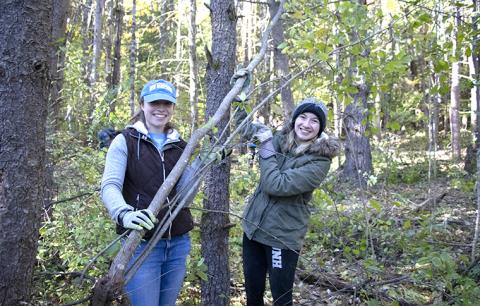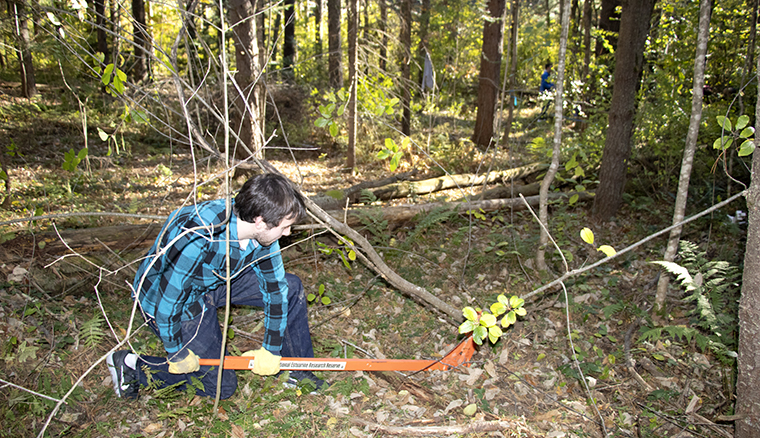Wildcats Battle Buckthorn

It’s a beautiful fall day, the trees alight with bright yellows and dull rusty oranges as 53 UNH students and community volunteers follow meandering, sun-dappled paths into College Woods. This isn’t just a walk in the proverbial park for our intrepid volunteers—it’s the annual Buckthorn Blitz. Their mission: to locate and eradicate glossy buckthorn, the invasive, non-native species that is currently overtaking a large section of College Woods.
Nature Groupies
Leading the walk are Steve Eisenhaure, land use coordinator for the UNH Office of Woodlands and Natural Areas and Malin Clyde, UNH Cooperative Extension specialist and program manager for Nature Groupie, which hosts this twice-yearly event. Nature Groupie is an Extension program that connects volunteers across New England for citizen science events, conservation workdays, training opportunities and other programs for those who are passionate about the environment.
Recognizing Your Enemy
We finally reach the stand of red pine where buckthorn has made its home, and Eisenhaure gives the students and other volunteers all the information they need to tackle the problem. He starts with how to recognize buckthorn, passing around a small sample of the shrub that the volunteers can study. Next, he demonstrates how to use the heavy metal weed wrenches when the roots are far too entrenched to pull up by hand.
While it may take more time, Eisenhaure explains why it’s essential to remove buckthorn by hand. Herbicide use isn’t an option in College Woods – the nearby Oyster River Reservoir is the source for UNH and Durham’s drinking water. Once everyone has weed wrenches and gloves, the group is off into the dense underbrush to fight the spread of buckthorn, one plant at a time.

Walking into the overgrown section of College Woods, there’s a stark difference between nearby areas already controlled by prior groups of students and volunteers. The section the volunteers are tackling today is a wall of shrubs and underbrush. A nearby section that was previously cleared is pristine and uncluttered, with tall, thin red pines soaring into the canopy. The walking is easy in the controlled section, while moving through the buckthorn undergrowth is hard—that is until the volunteers have started pulling out stems and entire trees, throwing them into piles.
Hands-on Experience
The event is a great hands-on learning opportunity for student interested in plants, ecosystems and sustainability. “I learned recently in class that some non-native species can become invasive and take over and out-compete native species for resources. I think that’s really interesting,” says Kelsea Batchelder, a sophomore with a dual major in marketing and sustainability.
Glossy buckthorn has been a “formidable” foe for Eisenhaure, and it’s a problem he hopes to have under control and well-managed within 10 to 15 years. He’s well on his way to that goal, thanks in part to the Nature Groupie volunteers who have made this project such a success.
Many of the student volunteers are Buckthorn Blitz veterans. Senior Griffin Barodi, an environmental engineering student says, “We’re seniors and we’ve been doing this every year. This is our seventh time working on this project in College Woods. We’ve really been able to see the progress that’s been made. This program really works.” Barodi is part of the Environmental Water Resources Institute, a student club that has previously partnered with Nature Groupie.

An Exemplary Natural Community
College Woods is a beloved, well-used resource, and protecting it for future generations is essential. The woods feature over 230 acres of woodlands and is considered an exemplary natural community, featuring hemlock, hardwoods and pines with trails for walking, running, snowshoeing, cross-country skiing and more.
Currently the Buckthorn Blitz project is in the control phase, with at least four to five more years before the invasive buckthorn will be completely removed for the first time. Each group that ventures into College Woods pushes the project closer to completion.
That goal is important to many of the student volunteers, who use College Woods for recreation. Georgia Bunnell, a marine biology student, says, “It’s really important for students to get involved in their local environment, especially with programs like this one that really have an impact on the ecosystem.”
Get Involved!
Interested in getting involved and hands-on with Nature Groupie? Our local environment needs you! Visit the Nature Groupie website or sign up for their newsletter to learn more about upcoming events.